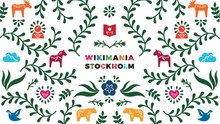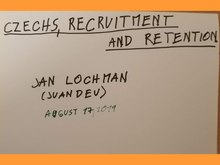2019:Community Growth/Lightning talks: growth ideas to take home
| This is an Accepted submission for the Quality space at Wikimania 2019. |
The Community Growth lightning talk session will take place on Saturday, August 17 from 16:00 to 17:30.
The session will feature a series of eight short talks (5-6 minutes each) and a shared 20 minute Q&A session at the end for the audience to ask questions of the presenters—and for the presenters themselves to discussion intersections and shared lessons between their work.
Accepted talks[edit | edit source]
Small grants for great results[edit | edit source]
Presenter(s): Ivana Madžarević, Miroslav Loci
This session is about involving new people by giving them a chance to experience Wikimedia world with small project activities. Microgrants are the perfect way to show someone who didn’t contribute to Wikimedia projects so far, how easy it is to do that. They have several advantages - everyone can apply it in their own community (even if they don’t have money), you don’t need a great amount of money, you don’t face high level of risk and most importantly people continue their work on Wiki projects after the projects end. They even submit more complex projects with higher levels of responsibilities. We think this is something worth sharing with other affiliates because it’s a model which can easily be implemented.
New Zealand Wikipedian at Large[edit | edit source]
Presenter(s): Giantflightlessbirds
Aotearoa New Zealand is underrepresented in Wikimedia projects because of our isolation, small population, and small editing community; in many ways coverage of NZ in Wikipedia is 5–10 years behind corresponding articles on Northern Hemisphere countries. It is a classic emerging community, with an educated population and good infrastructure, but with no Wikimedia user group, Wikipedians in Residence, or regular meetups.
For 12 months I was on a WMF project grant as the New Zealand "Wikipedian at Large", spending 2–6 weeks in organisations ranging from museums to nature reserves, over the entire length of New Zealand, training staff and helping them use their expertise to improve Wikipedia and make images, text, and video freely usable by the public. I also worked with the volunteer Wikipedia community, organising meetups and running public workshops and edit-a-thons.
More info:
- New Zealand Wikipedian at Large project (reports and media coverage)
- Des Helmore illustrations
- Call for images of Christchurch mosque shootings
- Kauri dieback wikiblitz
- Hancock, Farah. (10 July 2019). "The travelling Wikipedia salesperson." Newsroom.
Something small for everyone: quick contribution ideas with Wikidata[edit | edit source]

Presenter(s): Lydia Pintscher (WMDE)
Wikidata opens a ton of new ways people can contribute to our movement. There are new tools, new content, new entry points and more. This session will give you ideas you can take home to your community to get people involved through small tasks in their context. These ideas will be especially relevant for local community organizers, leaders of wiki projects and organizers of editathons and contests.
Old helping new helping old: cross-wiki collaboration[edit | edit source]

Presenter(s): C. Scott Ananian
We often attempt to classify wikis into three "stages of life":
- A young wiki, which needs content and finds its hardest challenge getting new content from users (safely, easily),
- A middle-aged wiki, whose greatest challenge is keeping readers and editors up to date with rapidly changing content, and
- An elderly wiki, which already has all the most valuable content and finds its hardest challenges to be maintaining its quality and getting its content securely to users.
There are different technical tools for these three ages of wikis, and different schemes for growth, which I expect will be covered in other sessions in this space. Communities tend naturally to aggregate around a specific "age"; for example, recent changes patrol and the Kiwix offline reader both have "elderly" communities.
What I would like to discuss in this session is "cross-generational" interactions between wiki ages, focusing on ways that wikis or content areas at different stages of growth might help each other.
Czechs, recruitment and retention[edit | edit source]

Presenter(s): Juandev
The goal of this session is to present Czech mentality as individual-competitive and high skill and show the difference from communities which are more social-helpers. Explain the ways of recruitment might be different in such communities and that than there are also different ways of supporting new contributors retention. From this session participants may get the understanding of different people personalities and what needs such people have, so what may help with their recruitment and retention.
Wiktionary as Teaching Tool: Case Study[edit | edit source]
Presenter(s): Reem Al-Kashif
A show case of the methods used to incorporate Wiktionary in university-level class followed by a discussion of the results and challenges and recommendations for improving future rounds of the same program, the interplay between Wikidata and Wiktionary, and copyrights and Wiktionary.
